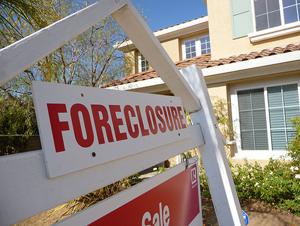Personal foreclosure
(image: respres/Flickr)
More than a million homes have already been lost of foreclosure in the last two years, and undoubtedly, there are more ahead.
Ryan Chittum is now a business writer for the Columbia Journalism Review, and he wrote about his experience.
"My folks were blue-collar. My father worked a graveyard shift at a grocery store. In the daytime, he laid carpet, and my mom worked in the cafeteria of my school so she could be home when we got home. We lived in south Tulsa, in a three-bedroom house on a big lot. We weren’t rich by any means, but we went on vacation every year. We had a decent, middle-class, Americana lifestyle."
Chittum’s father fell ill after many years of being exposed to harmful fumes from the carpet-laying job. His illness took his 70-80 hour workweeks out of the question. The workman’s compensation payments ran out and the family’s $10,000 savings ran out quickly.
They started to fall behind on their standard, fixed-rate mortgage and needed food stamps to survive.
Commenting on his mother’s reaction to this situation, Chittum says, "They were ashamed. Their philosophy, and how I was raised, and how their parents raised them, was that if you work hard in America you will be fine. You will get ahead. Things will work out for you. It just didn’t take into account that you might not be able to work."
Chittum details his family’s eventual eviction in a storyline that echoes what is happening in more and more homes today.
"Here and Now" is an essential midday news magazine for those who want the latest news and expanded conversation on today’s hot-button topics: public affairs, foreign policy, science and technology, the arts and more.
PRI’s coverage of economic security is supported by the Rockefeller Foundation and its Campaign for American Workders.
We want to hear your feedback so we can keep improving our website, theworld.org. Please fill out this quick survey and let us know your thoughts (your answers will be anonymous). Thanks for your time!
